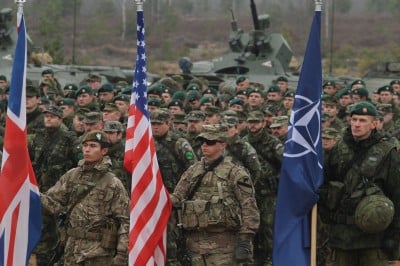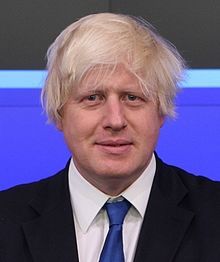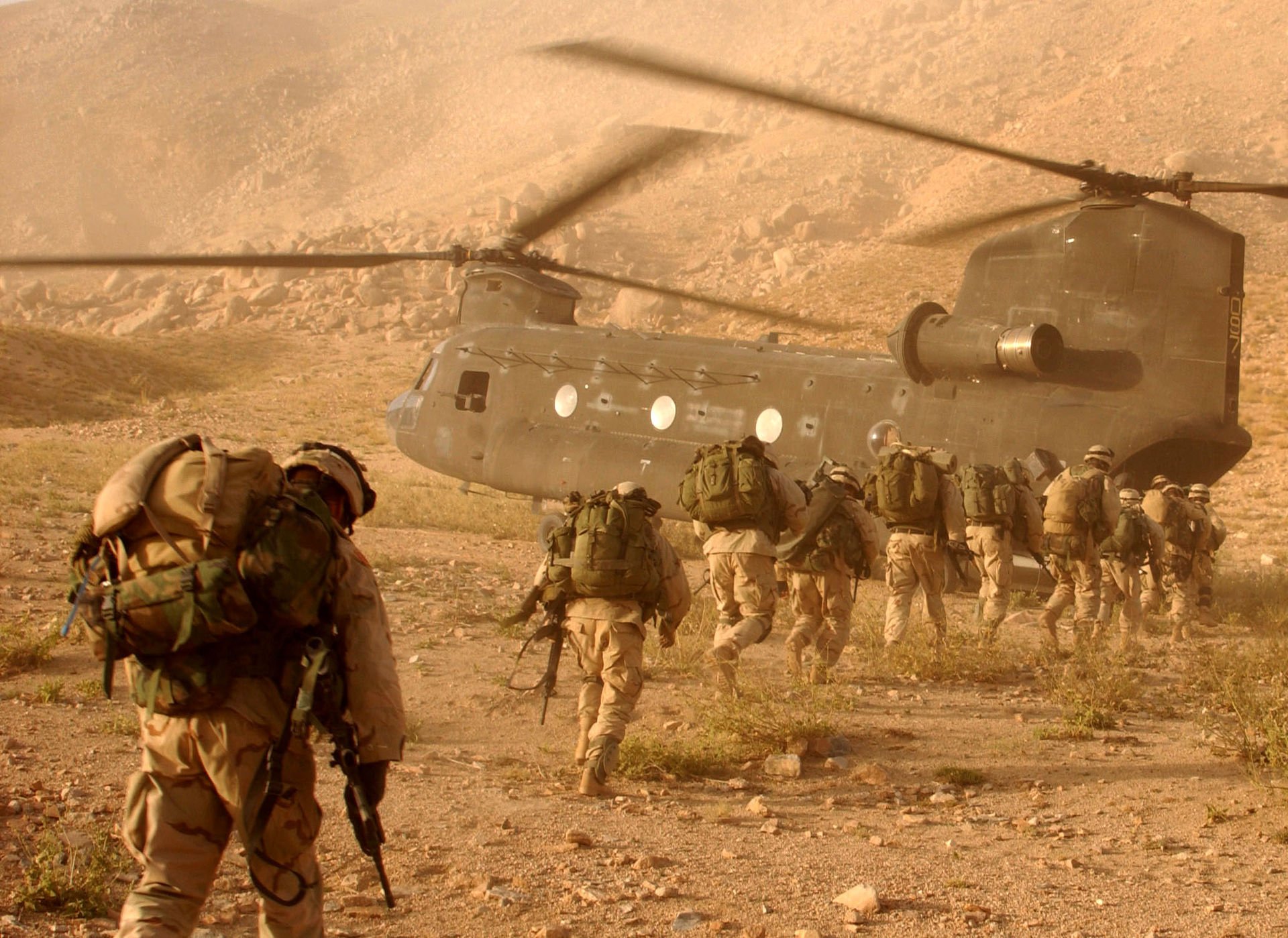The US Without NATO Could Mean No Wars and Terrorism in the World

NATO was primarily founded by the US with then-12 members in 1949 as a bulwark against Soviet aggression. NATO’s mission terminated following the collapse of the Soviet Union and the dissolution of Warsaw pact in 1991. At that time, there was no giant beyond Soviet Union to take up position, though the US scrambled to keep NATO running, otherwise the disbandment of NATO could mean a recipe for the US’s shrinking of supremacy over the world.
The other advantage by maintaining NATO is that it is a combined force that allows US to hold an overall grip on the European region. NATO involves 25 European member states among others while the European Union and the NATO have 22 members in common. In this row, France, Britain and the US are nuclear powers.
According to NATO treaty’s article 5,
if a member of the organization faces direct incursion from outside powers, the rest of members shall spring into its defense.
The most spectacular example and the only tragedy ever seen that represents this article was 9/11 attacks. The NATO powers were, indeed, on their own to go for helping the US, yet the enormity of world trade center’s havoc earned their sympathy to join US forces in the invasion of Afghanistan.
NATO’s latest mission began in 2003 in Afghanistan where it deployed thousands of troops through International Security Assistance Force (ISAF). By the term NATO, the finger is pointed at those few member states that really run things and hold a massive stake on the ground. The US and UK are the only two spearheads when it comes to the Afghan war. The rests below these two in the list are just operating under NATO with far fewer troops or some may even contribute to appease the US.
The US deployed NATO forces in Azerbaijan, Turkmenistan, Uzbekistan, Tajikistan, Kyrgyzstan, Pakistan and Indian Ocean, of which Uzbekistan demanded several million dollars as payment for exploitation of its soil against Afghanistan.
The second to US at the helm of NATO is the UK. This leading NATO member played more like an influential conduit for the passage of NATO’s proposals and plans into the European Union. But this trend seems to start faltering after the revolutionary Brexit referendum in the UK last year. Although the NATO and UK officials have ruled out a likely split of UK from the NATO following Brexit, it is presumed that the deadlock would start to loom in the longer term – if not in near one.
NATO binds its members to dedicate at least 2 percent of their GDP for defense spending, while only five members including the US, the UK, Greece, Poland and Estonia are less or well above the target. Amazingly, the powerful economies such as Germany and France are falling short in this area.
As aftereffect of the Brexit referendum, the UK could lose the most senior military position of Deputy Supreme Allied Commander which it held for more than 60 years. The deputy leadership among other key roles could possibly slip to France.
The other turning point triggered by Brexit is the EU’s intention to speed up the creation of independent military headquarters outside NATO. This idea, however, was frequently downplayed and turned down by the UK which it saw as a threat to the role of NATO. The UK had said last year it would veto such a proposal, because it may possibly undercut UK’s vigorous engagement in NATO.
 Given the pre-emptive use of force, NATO’s chief Jens Stoltenberg last year in a meeting in Brussels urged allies to keep anti-Russian sanctions alive. He said:
Given the pre-emptive use of force, NATO’s chief Jens Stoltenberg last year in a meeting in Brussels urged allies to keep anti-Russian sanctions alive. He said:
“The international community must keep pressuring Russia to respect its obligations”.
If it sees all this allegations to be hurled at Russia over Ukraine’s standoff, then NATO too has to end a protracted and costly war in Afghanistan, which Russia terms as “offensive”.
It was until Russia’s annexation of Crimea when NATO and Russia led easy marriage and would strike several cooperation deals. In the wake of Crimea’s annexation – whose reason was inferred as Russia’s fear over NATO’s plan to build military headquarters there – the organization froze relationship with Russia.
As a major determinant of NATO, Germany press for exercising of sanctions against Russia at a time this country is Russia’s largest trade partner, followed by France and Italy. By all this, we discover that the NATO and the EU go on the same trajectory after the latter approved anti-Russian bans and embargoes over Ukraine’s crisis which was sparked by NATO in the first place. While others believe the EU is NATO in the guise of a Union.
Given the EU’s drastic need for Russia’s energy resources as well as the broad Russian markets for European products, the EU, more or less, is eager to cut the intensity of sanctions and edge it towards the end. Moreover, the German businessmen and economists have vocalized opposition to further and tougher sanctions on Russia.
On the heyday of NATO deployments and engagements in Afghanistan, some wrecked sectors of this victimized country were shared out among a number of members for the purpose of revival. The US assumed the training and strengthening of the Afghan Army, Japan was handed over the “Disarmament, Demobilization and Reintegration” (DDR) project, Germany undertook training of the Afghan police, the UK picked war on narcotics and stationed only in southern Helmand province despite having second highest number of troops following the US, and Italy took on the responsibility of the justice sector reform.
Fewer would fit into their tasks, as Japan had no servicemen or armed forces at the time to forcefully disarm the militias. And the UK’s failure to tackle narcotics is largely on display in the eyes of world as Afghanistan still ranks the first for feeding world habits of addiction, let alone the booming drug business worldwide. Lastly, Italy was a poor choice for the justice sector’s reform thanks to being a big law-breaker and Mafia country in the Europe.

On the Syrian side, the latest chemical attack bears out the fact on the collusion and conspiracies of critical NATO members behind peppering of blames on Assad’s regime. First the US used every effort at disposal to direct the blame on Syrian government. Later the UK’s – also first in toeing the US’s line – foreign minister Boris Johnson meaninglessly called off an official trip to Russia allegedly over this country’s involvement in Syria and the gas attack. In third place, France inconsiderately released a report blaming Syrian government for chemical gas attack without a shred of evidence.
All these concurred attacks come as the international neutral investigators as well as Russian team sought to inspect the chemical attack for findings, but they said the US blocked them from participating in a formal investigation.
If it was not for NATO or concerted conspiracies, the UK’s Boris Johnson or French report had nothing to do with a far-regional chemical weapon attack, even if it was perpetrated by very Assad’s government.
The NATO’s pro-war European members are the cornerstone of the US’s decision-making process on waging a war or invading a country. North Korea, for example, might be on the brink of bursting into a war with US. Apart from South Korea’s opposition to the US-DPRK’s likely armed strife, the US might still strongly hesitate to instigate another endless conflict without consent of leading NATO members, importantly because it is unwilling to bear the brunt of costs and arms alone, and that’s why compelling of the NATO members to raise defense spending matters.
Back in 2003, France and Germany stood critical to the US war plans against Iraq. The Wall Street Journal at that time accused Germany of actively promoting American defeat. It concluded by declaring
“What President Bush calls ‘a coalition of the willing’ will become America’s new security alliance”, even though the two states continued to take several diplomatic initiatives to avert a military strike against Iraq which were not well covered in media.
The same year, French president Jacques Chirac and his Russian counterpart Vladimir Putin presented a joint declaration by France, Germany and Russia calling for extended weapons inspections in Iraq. It said:
“There is still an alternative to war. The use of violence can only be the last resort”.
It was a riposte to President Bush’s remarks just a week earlier that said,
“The game is over”.
After NATO representatives from Germany, France and Belgium vetoed military preparations for the protection of Turkey in case of war in Iraq, President Bush publicly accused Berlin, Paris and Brussels of “damaging NATO”.
Most NATO allies were distaste to the US’s invasion of Iraq, because the ploy to draw them into this [Iraq] war was not as elaborate as that of Afghanistan [9/11 attacks] and unconvincing for the European members. More than a decade later now, we notice a U-turn or a fair degree of rotation in some European and NATO members’ posture towards globalization of war and warmongering. It can be concluded that if major aides of the US – the UK, France and Germany – withhold military and non-military support to this superpower, the peace may descend into the earth over the long haul.


